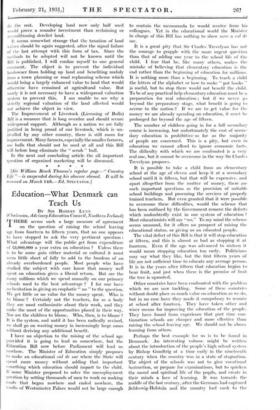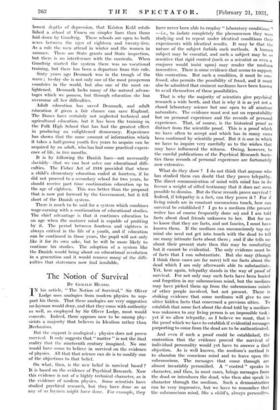Education—What Denmark can Teach Us
BY SIR ROBERT LYNN
(Chairman, Advisory Education Couneil, Northern Ireland) THERE seems such a large measure of agreement on the question of raising the schoOl leaving age from fourteen to fifteen years, that nd'one appears to have stopped to ask the very pertinent question i What adVantage will the public get from expenditure of £3,000,000 a year extra on education ? Unless there is to be some gain either material or cultural it must seem little short of folly to add to the burdens of an already overburdened people. Most people who have studied the subject with care know that money well spent on education gives a liberal return. But are the many millions, which we spend annually on our primary schools used to the best advantage ? I for one have no hesitation in giving an emphatic " no " to the question. We get little or no value for the money spent. Who is to blame ? Certainly not the teachers, for as a body they are most enthusiastic about their work, and they make the most of the opportunities placed in their way. Nor are the children to blame. Who, then, is to blame ? It is the system, and until it has been radically revised, we shall go on wasting money in increasingly large sums without deriving any additional benefit.
I have no objection to the raising of the school age provided it is going to lead us somewhere, but the Education Bill. now before Parliament will lead us nowhere. The Minister of Education simply proposes to make an educational cul de sac where the State will spend more money without adding that important something which education should impart to the child. If some Minister proposed to solve the unemployment question by setting thousands of men to work on making roads that began nowhere and ended nowhere, the vaults of Westminster Palace would not be large enough to contain the memoranda he would receive from his colleagues. Yet in the educational world the Minister. in charge of this Bill has nothing to show save a cul de It is a great pity that Sir Charles Trevelyan has not the courage to grapple with the more urgent question than that of adding one year to the school life of the child. I fear that he, like many others, makes the mistake of believing that elementary education is the end rather than the beginning of education for millions. It is nothing more than a beginning. To teach a child the letters of the alphabet or how to make " pot hooks " is useful, but to stop there would not benefit the child. To be of any practical help elementary education must be a preparation for real education ; but if we never go beyond the preparatory stage, what benefit is going to accrue to the nation ? If we are to get value for the money we are already spending on education, it must be prolonged far beyond the age of fifteen.
The number of children going in for a full secondary course is increasing, but unfortunately the cost of secon- dary education is prohibitive so far as the majority of people are concerned. This is a pity, but even in education we cannot afford to ignore economic facts. The difficulty with which we are confronted is a very real one, but it cannot be overcome in the way Sir Charles Trevelyan proposes.
It is possible to :take a child from an elementary school at the age of eleven and keep it at a secondary school until it is fifteen, but that will be expensive, and apart altogether from the matter of money, there arc such important questions as the provision of suitable school buildings and procuring the services of properly trained teachers. But even granted that it were possible to overcome these difficulties, would the scheme that has been outlined by the Government remove the defects which undoubtedly exist in our system of education ? Most educationists will say "no." To my mind the scheme seems unsound, for it offers no prospect of raising the educational status, or giving us an educated people.
The vital defect of this Bill is that it will stop education at fifteen, and this is almost as bad as stopping it at fourteen. Even if the age was advanced to sixteen it would mean stopping education too early. Politicians may say what they like, but the first fifteen years of life are not sufficient time to educate any average person. It is in the years after fifteen that education begins to bear fruit, and just when there is the promise of fruit the tree is uprooted.
Other countries have been confronted with the problem which we are now tackling. Some of these countries without doubt place as much value on education as we do, but in no case have they made it compulsory to remain at school after fourteen. They have taken other and wiser means for improving the education of the people. They have found from experience that part time con- tinuation schools are cheaper and more effective than raising the school leaving age. We should not be above learning from others.
Perhaps the best example for us is to be found in Denmark. An interesting volume might he written about the introduction of the people's high school system by Bishop Gundtrig at a time early in the nineteenth century when the country was in a state of stagnation. The object of the schools was not to give vocational instruction, or prepare for examinations, but to quicken the moral and spiritual life of the pupils, and create in their minds a love of learning. It was towards the middle of the last century, after the Germans had captured Schleswig-Holstein and the country had sunk to the lowest depths of depression, that Kristen Kold estab- lished a school at Funen on simpler lines than those laid down by Gundtrig. These schools are open to both sexes between the ages of eighteen and twenty-five. As a rule the men attend in winter and the women in summer. There are State grants and State inspection, but there is no interference with the curricula. When Gundtrig started the system there was no vocational training, but there has been a departure from this rule.
Sixty years ago Denmark was in the trough of the wave ; to-day she is not only one of the most prosperous countries in the world, but also one of the most en- lightened. Denmark lacks many of the natural advan- tages which we possess, but through education she has overcome all her difficulties.
Adult education has saved Denmark, and adult education if given a fair chance can save England. The Danes have certainly not neglected technical and agricultural education, but it has been the training in the Folk High School that has had the greatest effect in producing an enlightened democracy. . Experience has shown that the same amount of information which it takes a half-grown youth five years to acquire can be acquired by an adult, who has had some practical experi- ence of life, in live months.
It . is by following the Danish lines—not necessarily slavishly—that we can best solve our educational diffi- culties. The Fisher Act of 1918 provided that where a child's elementary education ended at fourteen, if he did not proceed to a secondary school- for two years, he should receive part time continuation education up to the age of eighteen. This was better than the proposal that is now put forward by the Government, but it fell short of the Danish. system.
There is much to be said for a system which combines wage-earning with a continuation of educational studies. The chief advantage is that it continues education to an age when the maturer mind is capable of profiting by it. The period between fourteen and eighteen is always critical in the life of a youth, and if education can be continued in those years, the pupil will not only like it for its own sake, but he will be more likely to continue his studies. The adoption of a system like the Danish would bring about an educational revolution in a generation and it would remove many of the diffi culties that statesmen now find insoluble.












































 Previous page
Previous page